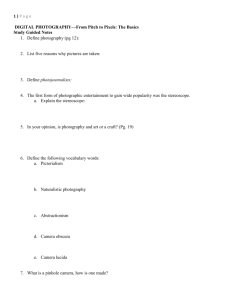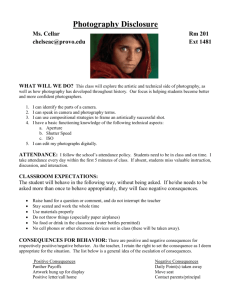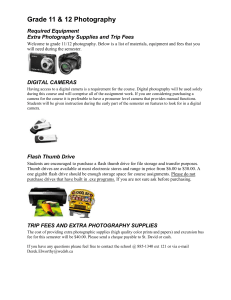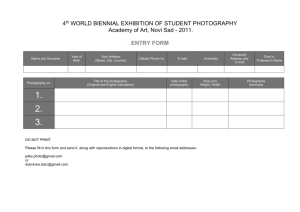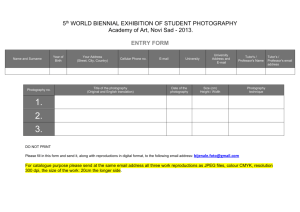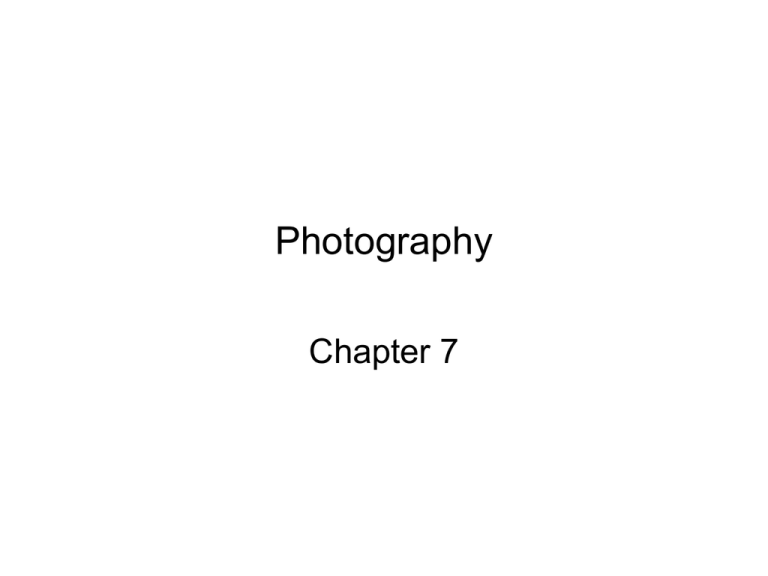
Photography
Chapter 7
Jane and Louise Wilson. The Silence Is Twice as Fast Backwards I. 2008.
72″ square.
Copyright ©2011, ©2009 Pearson Prentice Hall Inc.
Evolution of Photography
• Photography literally means light writing
• The concept of the camera started with
the camera obscura
– Camera obscura literally means dark room
– A box or room with a small hole projects
what is outside
– Originally used to assist with drawing
Evolution of the Camera Obscura. Sixteenth-century camera obscura.
Copyright ©2011, ©2009 Pearson Prentice Hall Inc.
Evolution of the Camera Obscura. Seventeenth-century portable camera
obscura.
Copyright ©2011, ©2009 Pearson Prentice Hall Inc.
Evolution of the Camera Obscura. Seventeenth- to nineteenth-century
table model camera obscura.
Copyright ©2011, ©2009 Pearson Prentice Hall Inc.
The First Photograph
• Made by Joseph Nicephore Niepce
– He used a camera obscura
– He sensitized a pewter metal plate
– It took eight hours to expose the photo
The “Invention” of Photography
• There is much debate about who
invented the process we know as
photography
• Some think Daguerre, others Talbot
Jacque Mande Daguerre
• Created the process known as
Daguerrotypes
• Involved highly toxic chemicals such as
mercury
• Has a highly metallic finish
Louis Jacques Mande Daguerre. Le Boulevard du Temple. 1839.
Copyright ©2011, ©2009 Pearson Prentice Hall Inc.
William Henry Fox Talbot
• Created the salt print
– He coated paper with salt and silver nitrate
– This darkens as it exposes to light
Potraits and Photography
• Before photography, painting was the
only way to have a portrait made
– Only the very rich could afford this
• With the invention of photography,
many people could now afford portraits
Julia Margaret Cameron. Julia Jackson. March 1886. 13-1/4″ × 11″.
Copyright ©2011, ©2009 Pearson Prentice Hall Inc.
Photography as an Art Form
• The public was reluctant to label
photography as an art form and to this
day, many people have doubt as to
whether it is an art form
• Photography, contrary to some
opinions, can be extremely expressive
and creative
Henri Cartier Bresson
• Invented the idea of “the decisive
moment”
– Decisive moment: that one moment when
you are looking through your viewfinder
and all the elements come together to
create the perfect photography
Henri Cartier-Bresson. Place de l'Europe Behind the Gare St. Lazare,
Paris. 1932.
Copyright ©2011, ©2009 Pearson Prentice Hall Inc.
Photography and Social Change
• Photography is uniquely suited to
documentary work
• From the very beginning photographers
used the medium to show others what
they could not see for themselves
• These photographers find it very
important to spread awareness and
affect change
Jacob Riis. Five Cents a Spot. Unauthorized lodging in Bayard Street
Tenement. c. 1890.
6-3/16″ × 4-3/4″.
Copyright ©2011, ©2009 Pearson Prentice Hall Inc.
Margaret Bourke-White. Louisville Flood Victims. 1938.
Copyright ©2011, ©2009 Pearson Prentice Hall Inc.
Ansel Adams. Clearing Winter Storm, Yosemite National Park, California.
1944.
Copyright ©2011, ©2009 Pearson Prentice Hall Inc.
Gary Braasch. Polar Bear Outside Barrow, Alaska. 2008.
Copyright ©2011, ©2009 Pearson Prentice Hall Inc.
Color Photography
• Color photography was looked down
upon by art photographers for many
years
• In 1976, William Eggleston exhibited his
color photographs of everyday objects
– He got horrible reviews
– He is now considered a pioneer in color
photography as art
William Eggleston. Untitled (Nehi Bottle on Car Hood). From Los Alamos
Portfolio. 1965–1974.
Copyright ©2011, ©2009 Pearson Prentice Hall Inc.
Binh Danh. Iridescence of Life #7. 2008.
14″ × 11″ × 2″.
Copyright ©2011, ©2009 Pearson Prentice Hall Inc.

